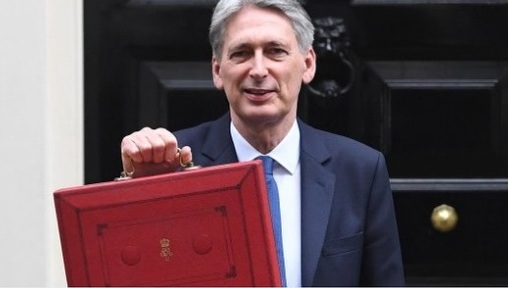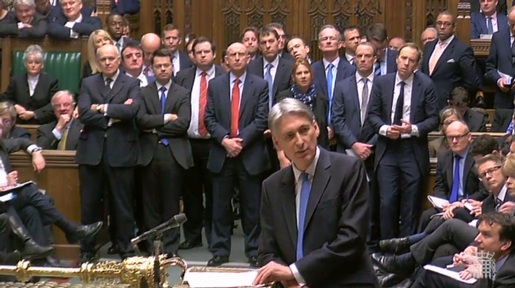Budget 2017: 'Seize opportunities' Chancellor fails to mention social care
Despite his speech’s repetitive slogan that the UK must ‘seize opportunities’ particularly in light of Brexit, the Chancellor of the Exchequer Philip Hammond spread no Christmas cheer for many of the most vulnerable in society, choosing to devote not a word of his budget speech to address social care.

What he did promise was a 4.4 per cent rise to the National Living Wage from April 2018 - up from £7.50 an hour to £7.83.
He also said he would fund a pay rise for nurses but only if one is recommended by an independent panel. He announced £2.8bn for NHS England up to 2022 - of which £350m would be immediately available to help get the NHS through the pressures of this winter.
But when it came to social care, it was as if Santa forgot the children this Christmas and oh! could you hear their cries - with the elderly and those reliant on social care left off the list this year.
Like budgets before, Mr Hammond found the need to sprinkle his speech with more than a few attempts at humour but sector leaders were not amused.
We will need more care home beds. Does anybody care?
Frank Ursell, chief executive officer of the Registered Nursing Home Association said: “Adult social care needed an injection of funds to increase the fees they receive from local authorities. We got nothing.
“From what I have seen it is the same old story, NHS, NHS, NHS. The Treasury does not seem to understand the difficulty that adult social care providers face. Those of us in the know are aware that adult social care will not survive without an increase in the fees that we are paid for our services - the £1bn put into adult social care earlier this year has done nothing for [care home] fees.
“CQC reported that there were 4,000 less nursing home beds this year. We need more beds not less by 2031 (when the baby boomers become 85) we will need 120,000 more beds than we have at the moment ... does anybody care? I can't see anybody understanding the situation, never mind caring."
Clarkson not the only one 'snubbed by Hammond and May'

Mr Hammond said the British economy will grow by 1.5 per cent in 2017 - a downgrade from the two per cent forecast made in March, according to the Office for Budget Responsibility. His reforms to Universal Credit will remove the seven-day waiting period and ensure that a household needing an advance can access a full month's payment within five days of applying.
He also announced extra funds and tax incentives for electric car drivers to prepare the way for driverless cars and quipped: "I know Jeremy Clarkson doesn’t like them, but there are many other good reasons to pursue this technology so today we step up our support for it. Sorry Jeremy, not the first time you’ve been snubbed by Hammond and May."
But as the Chancellor reminded us, Clarkson wasn’t alone when it came to being snubbed by a Hammond and May. Janet Morrison, chief executive of the older people’s charity Independent Age, said: ”With nearly a quarter of the population set to be over the age of 65 by 2030, making Britain ‘fit for the future’ must surely include setting out plans to meet the needs of our ageing population.
’1.2 million older people have an unmet care need’
“The Chancellor has done nothing new to tackle the current funding gap of £1.3bn and meet the urgent needs of older people today, let alone in 2030. Some 1.2 million older people are currently estimated to have an unmet care need, and just this week we have published research showing that some councils are struggling to meet their responsibilities under the Care Act.
“A country fit for the future must be fit for all. If we are to ensure that no one is left behind, as the Prime Minister promised when she formed the current Government, it is disappointing to see an opportunity missed to work towards the UK being the best place in the world to grow old.”
The Chancellor did however resist the temptation to make any major changes to pensions to pluck this 'low hanging fruit' in order to raise cash. The pensions lifetime allowance (the amount you can build up in tax-relieved pensions savings) will increase to £1,030,000 in line with the Consumer Price Index. In previous budgets, pensions allowances were reduced.
Nigel Green, chief executive of financial consultancy deVere Group said: “For far too long successive British governments have deemed people’s hard-earned retirement funds as an easy, ‘go-to’ option when it needs to bolster revenue.
"Finally, it would appear that the Treasury is understanding that pensions are typically people’s most important asset and should not be seen as ‘low hanging fruit’ to be plundered by the State.”
No carpe diem budget
But this move was overshadowed by Mr Hammond's decision to give social care a wide berth in his Autumn Budget.
Vic Rayner, chief executive of The National Care Forum said: “The Chancellor spoke today of the significant productivity challenge facing the UK economy, yet failed to take the opportunity to invest in a sector that employs over 1.5 million workers.
“The opportunities that investment in technology, buildings and workforce skills would bring to the social care sector would be felt at both a local and national level. Recent analysis by Skills for Care estimate that the social care sector contributes no less than £41.8bn to the English economy.”
Earlier this month, Cabinet Office minister Damian Green announced the Government is to start talking to sector leaders to help shape its long-awaited social care Green Paper proposals, which are scheduled to be published in the Summer of 2018.
Ms Rayner added: "The Chancellor has played an own goal in his quest to improve UK productivity through his failure to provide short-term support to a sector described by the regulator as one where the stresses and strains cannot be sustained. The role of the Green Paper in identifying a long-term sustainable solution for social care has never seemed so urgent.”
Latest News Analysis
 04-Sep-19
Extra £1.5 billion announced for social care in Chancellor's Spending Review
04-Sep-19
Extra £1.5 billion announced for social care in Chancellor's Spending Review
 02-Jul-19
Department of Health forced to rethink care homes' nursing rates after legal challenge
02-Jul-19
Department of Health forced to rethink care homes' nursing rates after legal challenge
 18-Jun-19
Overnight care workers forced to sleep in offices and told 'bring your own bedding'
18-Jun-19
Overnight care workers forced to sleep in offices and told 'bring your own bedding'
 14-Jun-19
Back in the closet: Third of care home staff have had no LGBT+ awareness training
14-Jun-19
Back in the closet: Third of care home staff have had no LGBT+ awareness training
 11-Jun-19
PM candidates on social care: Rory Stewart calls fixing care an 'unfinished revolution'
11-Jun-19
PM candidates on social care: Rory Stewart calls fixing care an 'unfinished revolution'